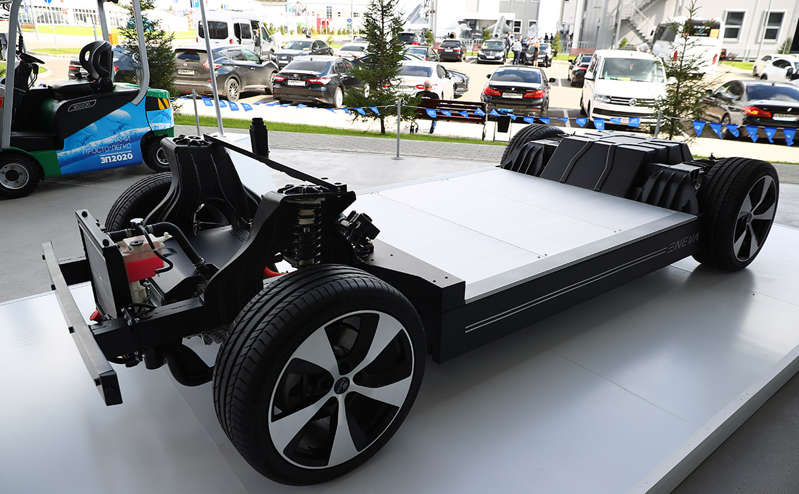
The Almaz-Antey aerospace defense concern presented a self-propelled electric platform at the Army-2021 forum, which takes place from August 22 to 28 in the Moscow region, the RBC correspondent was convinced.
The development literally looks like a metal platform on wheels with equipment. From the materials at the Almaz-Antey stand it follows that the platform can be used independently or as a basis for the production of vehicles of any category. It can move in remote control mode or along a given route, detect obstacles and transport products and cargo. The platform can withstand loads up to 1650 kg, and its own weight is 1200 kg. It includes two electric motors, which are powered by a 90 kWh battery. On a single charge, the platform can cover 400 km. The dimensions of the platform are 4.3×1.89×1.03 m. The main manufacturer is the Obukhov plant.
As explained by a RBC source familiar with the development, “self-propelled” means that the platform can be remotely controlled by a pilot using wireless communication. The prototype has sensors that allow it to have technical vision: ultrasonic sensors and lidar (detecting and determining the range of an object using light).
“Additional equipment can be added to the platform to create a full-fledged vehicle, ranging from a light drone to a heavy cargo one. You can also install navigation equipment, video cameras, lidars, sonars (sound detection of objects using acoustics) and long-range radars, ”said the interlocutor of RBC. Investment in the development has not been disclosed. According to a source of RBC, the creation of the platform was financed by the concern from its own profits. Partners were also involved in the development, but their names were not disclosed. Subject to serial production (from 40 thousand per year), the cost of one platform will be from 800 thousand to 1.2 million rubles, a source told RBC in the concern.
Earlier, another source of RBC, familiar with the plans of Almaz-Antey, said that the concern is working on the creation of a prototype of an electric crossover vehicle. The representative of the concern did not answer RBC's questions regarding this development. However, the source confirmed that in the future, Almaz-Antey plans to produce an electric car.
Why “Almaz-Antey” took up electric transport
Almaz-Antey unites about 60 enterprises engaged in the development and production of weapons for air and missile defense, including the S-300, S-400 and S-500. 100% owned by the state. The concern needs the development of electric vehicles to increase the share of civilian products in its portfolio. According to the presidential order of December 5, 2016, the share of such products for organizations of the military-industrial complex should be at least 30% by 2025 and at least 50% by 2030.
Also, electric vehicles can be useful to the main buyer of the concern's products. In 2019, the Commander-in-Chief of the Ground Forces, Oleg Salyukov, said in an interview with Krasnaya Zvezda that the Ministry of Defense was working on the issue of creating electric vehicles for the army.
How drones and electric vehicles are being developed in Russia
In the fall of 2020, Sberbank and Yandex simultaneously announced the creation of companies for the development of unmanned vehicles. Yandex presented the first prototypes of its drone in 2016 – these are ordinary cars equipped with special sensors and sensors. Sberbank in June this year at the St. Petersburg International Economic Forum (SPIEF) showed a prototype of an unmanned electric taxi “FLIP”, which can accommodate up to six people. At the same forum, the Ministry of Transport announced the start of a project to create an unmanned logistics corridor on the M-11 highway between Moscow and St. Petersburg. It is expected that from 2024 unmanned trucks will be able to run on it. Among the project participants are the Digital Transport and Logistics Association, KamAZ enterprises, National Telematic Systems, SberAvtoTech, Business Lines, Globaltruck and First Forwarding Company, as well as the X5 Group retailer.
Several companies have previously announced plans to create electric vehicles in Russia. In 2020, Peter the Great St. Petersburg Polytechnic University together with KamAZ presented a prototype of an inexpensive electric vehicle KAMA-1. In August last year, the head of the Ministry of Industry and Trade Denis Manturov said that by the end of 2020, the serial production of the Zetta electric car would begin in Togliatti, but since that moment there was no information about the start of production.
On Monday, August 23, Prime Minister Mikhail Mishustin approved the Concept for the development of production and use of electric road transport until 2030. By this time, at least 10% of the total volume of vehicles produced in the country must be electric, at least 72 thousand charging stations, etc., must be put into operation.

